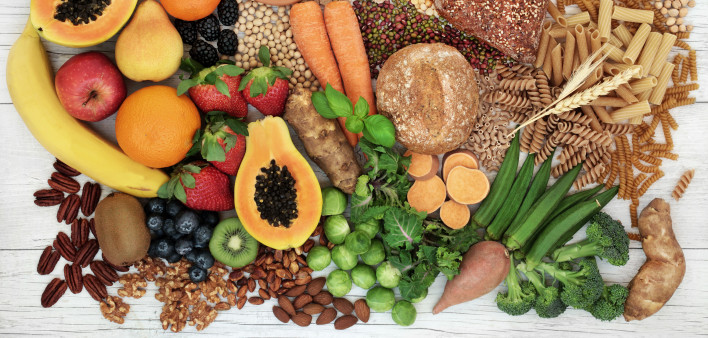A balanced, low-fat diet, rich in fruits and vegetables and grains, cuts postmenopausal women’s risk of dying of breast cancer by 21%, according to results from a study of nearly 49,000 women followed over nearly 20 years. The study, to be presented in June at the American Society of Clinical Oncology (ASCO) annual meeting in Chicago, is part of the Women’s Health Initiative, a larger research project designed to evaluate the effects of diet and other factors on women’s health.
In this study, some women were randomly assigned to follow a diet with a target of reducing total fat to 20% of total calories and to increase their consumption of vegetables, fruits and grains. They were asked to stick to this diet for eight and a half years. The rest were asked to eat as they would normally, which turned out to mean that fat accounted for about 32% of their total calories. After that period, both groups were followed; the total follow-up averaged 19.6 years. The women were between ages 50 and 79 when the study began in the early 1990s. Key takeaways:
- It’s the strongest evidence yet that diet matters. Previous studies have been primarily observational, looking for statistically significant connections between diet and breast cancer. The results have been mixed, and those studies weren’t designed to establish causation. This one is different. “This is the first randomized, controlled trial to prove that a healthy diet can reduce the risk of death from breast cancer,” said lead study author Rowan Chlebowski, MD, PhD, of the Los Angeles Biomedical Research Institute at Harbor-UCLA Medical Center in Torrance, California, at the prepublication ASCO press conference. As Neil Iyengar, MD, a medical oncologist at Memorial Sloan Kettering Cancer Center who was not involved in the study, told Time magazine, “It is the first to show in a very robust way that we can improve outcomes and prevent cancer-related deaths just by changing the diet.”
- Women on the low-fat diet were not actually less likely to develop breast cancer—just less likely to die of it. It is possible that as the study continues, a prevention effect may become evident. But a key finding is that this healthy diet may protect women by preventing early, tiny tumors from progressing—long before they might be identified as breast cancer. “Diet may influence the growth of existing cancers,” explained Chlebowski. The new research may open new avenues to study how diet may affect outcomes for people being treated for breast cancer.
- The benefit is greater for women who have other metabolic risk factors, such as obesity, diabetes or high blood pressure. Indeed, growing evidence suggests that obesity—and related metabolic impairments, such as insulin resistance—plays an important role in the development of many cancers. In a separate study, the researchers looked at a subset of women with metabolic syndrome, a constellation of symptoms such as high levels of belly fat, high blood sugar, high blood pressure, low levels of HDL cholesterol and high triglycerides. “It’s an inflammatory cascade, which can produce growth factors [that increase cancer risk],” said Chlebowski. Women with this metabolic disorder are three times as likely to die of breast cancer as women with normal metabolic function. The low-fat, plant-based diet reduced that risk substantially. Among women with three or four of these metabolic risk factors, those who stuck with the low-fat, plant-based diet were 69% less likely to die of breast cancer. “Metabolic syndrome identifies a subgroup of postmenopausal women who are most likely to benefit from dietary intervention,” said Chelbowski.
- Your diet doesn’t have to be perfect to reduce your risk. Cutting fat isn’t easy, and most of the women weren’t successful at reducing their total intake to 20% of calories or less. They averaged 24.5% after one year and about 30% after eight years—less than the 32% they consumed at the start of the study but not much.
- It’s not just about fat. The women were counseled to eat more vegetables, fruits and grains and in their effort to cut fat often reduced the portion sizes of the meats and dairy they ate. It is possible that eating more high-fiber, plant-based foods and fewer animal products high in saturated fats played a significant role in the benefit demonstrated by this diet—further studies will look into this possibility. Newer nutritional guidelines have moved away from the low-fat message to one that emphasizes, for example, whole grains over refined starches and substituting healthier fats such as olive oil for saturated fats found in beef and butter. Said Chlebowski, “Many reduced portion sizes of meat and dairy—and their caloric intake—went down too.” Those changes also helped women stay leaner. Those on the diet wound up about 3% leaner than those on the control diet. “Now we focus on saturated fat,” explained cancer prevention expert Karen Basen-Engquist, PhD, MPH, of the MD Anderson Cancer Center in Houston to NBC News. “It’s possible that if they designed this study today, they’d probably have a much bigger emphasis on saturated fat that comes from meats and dairy products.”
To read more about a cancer-preventive diet, click here.
To read more about breast cancer, click here.
To read the abstract, click here.







Comments
Comments